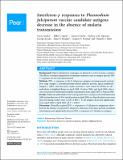Interferon-γ responses to Plasmodium falciparum vaccine candidate antigens decrease in the absence of malaria transmission

View/
Publication Date
2017Author
Cyrus Ayieko, Bilha S Ogola, Lyticia Ochola, Gideon AM Ngwena, George Ayodo, James S Hodges, Gregory S Noland, Chandy C John
Metadata
Show full item recordAbstract/
Background. Malaria elimination campaigns are planned or active in many countries.
The effects of malaria elimination on immune responses such as antigen-specific IFNγ responses are not well characterized.
Methods. IFN- γ responses to the P. falciparum antigens circumsporozoite protein,
liver stage antigen-1, thrombospondin-related adhesive protein, apical membrane
antigen-1, MB2, and merozoite surface protein-1 were tested by ELISA in 243
individuals in highland Kenya in April 2008, October 2008, and April 2009, after a
one-year period of interrupted malaria transmission from April 2007 to March 2008.
Results.While one individual (0.4%) tested positive for P. falciparumby PCR inOctober
2008 and another two (0.9%) tested positive in April 2009, no clinical malaria cases were
detected during weekly visits. Levels of IFN-γ to all antigens decreased significantly
from April 2008 to April 2009 (all P < 0.001).
Discussion. Naturally acquired IFN- γ responses to P. falciparum antigensare shortlived in the absence of repeated P. falciparum infection. Even short periods of malaria
interruption may significantly decrease IFN-γ responses to P. falciparum antigens.
Collections
- Department of Zoology [161]
